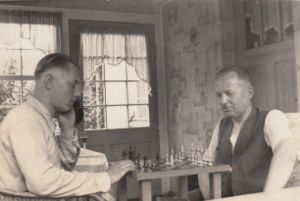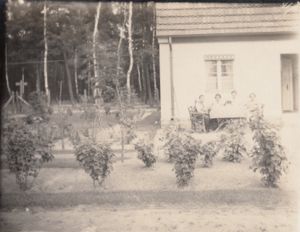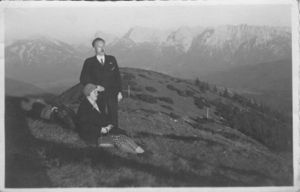Contents |
General Information
Max Ströhmer, born October 24, 1880 in Rummelsburg, Pomerania, was a German printer and communist politician in the times of the Weimar Republic and Nazi Germany and therefore became arrested and persecuted several times by the Hitler Regime. After WWII he worked in the city council of Erkner and eventually became provisional mayor of Erkner in 1950. In 1946 he was officially acknowledged as a "Persecutee of the Nazi Regime". Max was married to Margarethe Rietz since 1921. He had no direct descendants, but was stepfather to his wife's son Hans Rietz. Max Ströhmer died on February 18, 1954 in Rüdersdorf, Germany.
Biography
Parents, Childhood and Apprenticeship (1880 - 1902)
Max August Karl Ströhmer was born on October 24, 1880[1] as second child[2] to his parents in the Pomeranian town of Rummelsburg (today: Miastko in Poland). There is no further information about his older sibling and his father. Just, that he was the railway worker Poch and died in an railway accident shortly before the birth of his second child.[2] That's why Max got his mother Alexa's maiden name: Ströhmer. She was one of seven children of a farmer's family. After her husband's accident she has fought a long lawsuit against the Königlich Preußische Staatsbahnen (Royal Prussian State Railways) and eventually received a little pension of 36 Mark per month. However, the little family had spent most of their assets for the trial.[2] The sources don't tell more about Max Ströhmer's childhood.
In 1895, when he was about 15 years old, Max started a four years long apprenticeship as printer and compositor.[2] There is no mention of where he was an apprentice. It's likely that at this time he already has been in the Westphalian city of Iserlohn. Because it was there, where he joined the Social Democratic Party of Germany (SPD) in 1902, after his friend and colleague Oskar Hoffmann introduced him to social-democratic ideas.[3]
1st period in Berlin (1905 - 1921)
After his journeyman years Max Ströhmer came to Berlin where he was the Social Democratic Party's district leader in Berlin's 2nd electoral district from 1905 until 1913.[2][3] It was then when he overtook the Neukölln based printing office "Karl Weiß Nachfolger", which he used for illegally printing pamphlets for the "Berlin General Strike"[3] - most likely reffering either to the April Strike of 1917 or to the January Strike of 1918. There are no mentions about any legal consequences, though. In 1915/16 he joined the Spartacus League[2] and as a follower of Karl Liebknecht[3] became a member of the newly founded Communist Party of Germany (KPD) in 1920.[4]
For the following years the sources are inconsistent with each other. According to one source, Max Ströhmer became a typesetter in the "Norddeutsche Buchdruckerei-AG" Berlin in 1918[2] - that means shortly before or even after the end of World War I. According to another, this already happened earlier, namely "in the course of World War I".[3] In the Berlin Address Books though, Ströhmer is listed as owner of the printing office "Karl Weiß Nachfolger" from 1915 until 1920.[5] Nevertheless, the sources concordantly report that Max Ströhmer soon became member of the "Norddeutsche Buchdruckerei-AG" Workers' Council and eventually even its chairman and member of the board of management.[2][3]
During this time he also got to know his future wife Margarethe Rietz, born Klein. She still was married, but Max and her started having an affair. That's why her husband sued for divorce. Result: Margarethe was blamed for adultry and the marriage between Louis and Margarethe Rietz got divorced on January 5,1921.[6] Not even half a year later she then married Max Ströhmer. This is unusual because according to German law there have to be at least 10 months beween the divorce and a new marriage. Nevertheless, she was exempted from this waiting period on April 20, 1921 by the Preußisches Amtsgericht Neukölln (Prussian District Court of Neukölln).[7] So the wedding of Max Ströhmer and Margarethe Rietz could happen on June 21, 1921 in the Neukölln district of Berlin.[8] A receipt from September 21, 1921 indicates that the couple bought a piece of land in Erkner, a Berlin suburb. Here Max Ströhmer built the family's future house. But construction lasted for many years.[9]
Time in Cologne and PEUVAG (1921 - 1925)
Reason for this was that in 1923 Ströhmer responded to the call of the Communist Party's Central Comittee to move to Cologne on the Rhine. There he became manager of the "Druckerei- und Verlagsgenossenschaft" (Printing Plant and Publishers Association). In this function he published several newspapers such as "Sozialistische Republik" (Socialist Republic) and "Aachener Arbeiter Zeitung" (Aachen Workers' News).[2] As manager of this party company he worked together with several well-known Communists such as Wilhelm Florin, Jean Winterich, Georg Hansen, Franz Dahlem and Lex Ende.[3][10]
Together with his colleagues Felix Schmidt, Albert Meyer and Theo Gabbey he founded the "PEUVAG" (Papier-Erzeugungs- und Verwertungs-Aktiengesellschaft), the Paper Production and Utilisation Corporation, and became manager of its first branch in Cologne.[3]
2nd period in Berlin (1925 - 1929)
After he was on trial twice at the English Military Court in British occupied Cologne for his radical communist activities, the Communist Party's Central Comittee brought him back to the PEUVAG head office in Berlin in 1925. There he became Technical Director for all of the party's 16 Printing Plants in Germany.[2][3]
It was a year later, on September 1, 1926 when the couple finally could move into its house in Erkner. This is proven by a bill by the local Carrier Company of Wilhelm Mertin, which shows the costs of 50 Mark for the removal from Neukölln to Erkner.[9]
In addition to his work at the PEUVAG Max Ströhmer continued to be politically active. As such he has worked alongside with Hugo Eberlein at the Central European Section of the Comintern from 1927 until 1932.[2][3] There, he was responsible for the expansion of communist print media in Scandinavia and Czechoslovakia. In Prague - where he worked together with Klement Gottwald - he became arrested twice and eventually deported.[3]
Time in Hamburg and Life under Nazi persecution (1929 - 1945)
In December 1929 Ströhmer went to Hamburg responding to a call by Ernst Thälmann, who was searching for someone to be the Hamburger Volkszeitung's (Hamburg People's News) manager.[2][3] Additionally, Max also worked as Finance Deputy of the State of Hamburg.[3] His Hamburg companions were the author and future President of the East German Academy of Arts Willy Bredel and the future minister for State Security of the GDR Ernst Wollweber.[10] When the National Socialists gained governmental power, they started persecuting communists all over Germany such as Max Ströhmer. He was arrested in April 1933 by the SA and SS Nazi organisations[3] and accused of High Treason for illegaly founding a printing plant.[2] Until the trial started in October, Max was kept imprisoned for 7 months in solitary confinement. According to the sources, the trial failed and therefore he was sentenced to two years imprisonment for subversive propaganda by the Hanseatic Special Court.[2][3]
The sources concordantly report that Max Ströhmer may have been tortured and abused during his term of imprisonment, as he returned home to his family in Erkner as an invalid, suffering from articular rheumatism.[2][3] Additionally, his grandchildren remember their grandfather Max's distinct humpback and physical handicaps.[11] Even after release from prison he was arrested by the Gestapo Secret Police several times throughout the whole time of Nazi dictatorship.[2]
Life after WWII (1945 - 1954)
Immediately after the German surrender in 1945 Max Ströhmer started working for the town administration in Erkner.[4] First he was employed as an tax office assistant, in 1947/48 he became head of the finance department.[12][13] The News Sheet for Erkner announced on March 6, 1946 that Max Ströhmer was officially acknowledged as a Persecutee of the Nazi Regime.[14] This status was connected with a little pension.[15]
In a letter from January 2, 1950 to Wilhelm Pieck, President of the GDR, on the occasion of Pieck's 74th birthday, Ströhmer writes:
I myself work, following your example, equally steadfast for rebuildung our democratic state and especially our destroyed community of Erkner, in which I work as deputy mayor.[16]
After the Social Democratic Party was forced to join the Communist Party, they formed the new Socialist Unity Party (SED), of which Ströhmer became a member, too. At that time the Socialist Unity Party was second just to the Christian Democratic Union (CDU) in Erkner and therefore provided the Deputy Mayor with Max Ströhmer. In February 1950 the mayor Peter Ackers (member of the CDU) fled to West Germany[15], what made Max Ströhmer become provisional mayor of Erkner until the new elections on March 3, 1951, when Erwin Köhler became new mayor of Erkner.[17] Max Ströhmer retired aged 71 at the end of the same year.[18]
Since 1952 he was in hospital several times due to a heart disease.[10] Apart from his high age, this might have been one main reason for his retirement. Max Ströhmer passed away two years later on February 18, 1954 in the County Hospital in Rüdersdorf near Berlin.[19] He was buried in the local cemetery in Erkner. In 1963 his wife Margarethe Ströhmer was buried in the same grave plot, 1980 his daughter-in-law Margarete Rietz and in 1988 his stepson Hans Rietz.[11]
Sources
Footnotes
- ↑ Königlich Preußisches Standesamt Rummelsburg: Geburtsurkunde Max August Karl Ströhmer. Nr. 181/1880.
- ↑ 2.00 2.01 2.02 2.03 2.04 2.05 2.06 2.07 2.08 2.09 2.10 2.11 2.12 2.13 2.14 2.15 N.N.: Kurzbiographie Max Ströhmers. Erkner, 1971
- ↑ 3.00 3.01 3.02 3.03 3.04 3.05 3.06 3.07 3.08 3.09 3.10 3.11 3.12 3.13 3.14 3.15 Der Vorstand der Ortsgruppe Erkner der SED: Brief an den Genossen Max Ströhmer. Erkner, 1953
- ↑ 4.0 4.1 N.N.: Brief an die sowjetische Kommandantur in Berlin-Karlshorst mit Auflistung vertrauenswürdiger Kommunisten in Erkner
- ↑ Berliner Adressbuch 1896-1943: unter Benutzung amtlicher Quellen. Berlin: Scherl 1896-1943.
- ↑ Landgericht II Berlin: Urteil im Prozess Louis Rietz gegen Margarethe Rietz, geb. Klein.
- ↑ Preußisches Amtsgericht Neukölln: Befreiung von dem Ehehindernisse der zehnmonatigen Wartezeit. Neukölln, 20.04.1921.
- ↑ Königliches Standesamt I Neukölln: Eintrag Nr. 553/1921. Max Ströhmer und Margarethe Rietz. Abschrift des Heiratsregister der Stadt Neukölln
- ↑ 9.0 9.1 Ströhmer Max: Gesammelte Rechnungen und Belege. Erkner, 1921-1934.
- ↑ 10.0 10.1 10.2 Ströhmer, Max: Brief an das Parteisekretariat der SED in Erkner b. Berlin. Erkner, 18.12.1953.
- ↑ 11.0 11.1 Bickel, Sonja: Erinnerungen. Erkner, 12.08.2012.
- ↑ Rat der Gemeinde Erkner: Organigramm der Gemeindeverwaltung Erkner.
- ↑ Rat der Gemeinde Erkner: Besetzung der Planstellen bei der Gemeindeverwaltung Erkner.
- ↑ Bezirksbürgermeisterei Erkner: Nachrichtenblatt für Erkner, Grünheide, Spreeau, Mönchwinkel. Nr. 2.
- ↑ 15.0 15.1 Information given to Daniel Schewe by F. Retzlaff, Chronicler of Erkner in 2013.
- ↑ Ströhmer, Max: Brief an Wilhelm Pieck zu dessen 74. Geburtstag. Erkner, 02.01.1950.
- ↑ Rat des Kreises Fürstenwalde (Spree): Entbindung Max Ströhmers von der Funktion des Bürgermeisters der Gemeinde Erkner. Fürstenwalde, 16.03.1951.
- ↑ Rat des Kreises Fürstenwalde (Spree): Dankesschreiben an Max Ströhmer zur Pensionierung. Fürstenwalde, 14.11.1951.
- ↑ Standesamt Rüdersdorf: Sterbeeintrag Nr. 64/1954. Max August Karl Ströhmer.
Additional Sources
- Please see the Sources Page for an overview of sources and still unreviewed documents on Max Ströhmer's life.
Further Research
Open Questions
- Who was the father of Max Ströhmer? Just his last name (Poch) is known.
- Who was Max Ströhmer's sibling? Are there any more family members?
- When did Max Ströhmer move to Iserlohn? Did he move with his family or on his own?
Unreviewed Documents
- Please see the Sources Page for an overview of sources and still unreviewed documents on Max Ströhmer's life.
Citing this record
Schewe, Daniel: "Max August Karl Ströhmer (1880-1954)". Wikitree. <https://www.wikitree.com/wiki/Ströhmer-2>. Accessed April 28, 2024.
No known carriers of Max's ancestors' DNA have taken a DNA test.
Have you taken a DNA test? If so, login to add it. If not, see our friends at Ancestry DNA.
S > Ströhmer > Max August Karl Ströhmer
Categories: Rummelsburg, Rummelsburg, Pommern | Berlin, Deutschland | Erkner, Brandenburg | Printers | Social Democratic Party of Germany | Communist Party of Germany | Socialist Unity Party of Germany





